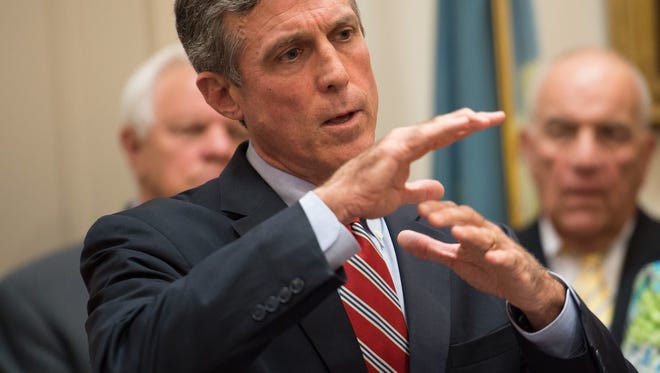Carney calls Trump's offshore drilling plan 'counter-productive'
 Scott Goss
Scott Goss
Gov. John Carney wants no part of the Trump administration's plan to allow oil and gas drilling in the Atlantic Ocean.
The governor's office on Tuesday released an Aug. 14 letter to U.S. Interior Department Secretary Ryan Zinke voicing Carney's opposition to the agency's rewrite of a five-year drilling plan that excluded drilling on the outer continental shelf off the East Coast.
Calling the plan "counter-productive" and "an inefficient use of government resources," Carney cited environmental concerns and the proposal's potential impact on Delaware's fishing and tourism industries.
"Preserving the coastal environment is essential to Delaware's economic well-being, as well as vital to maintaining a high quality of life for its residents," he wrote. "The majority of coastal residents perceive offshore oil and gas exploration as a threat to their communities and livelihoods."
STORY:Delaware senators offered tepid praise on Trump's Afghanistan policy
STORY:Carney signs Coastal Zone Act reform bill
Several environmental groups cheered Carney's stand, which echoes comments he made in April.
"We're very pleased he would support the opposition to the proposal that's been joined by so many environmentalists, citizens and the mayors of all our coastal towns," said Suzanne Thurman, executive director of the Marine Education, Research and Rehabilitation Institute.
The Atlantic Coast was not included in the five-year drilling plan finalized by the Obama administration last year. But Trump in April issued an executive order that directed the Interior Department to review that decision as a part of his pledge to increase domestic production of fossil fuels.
The department is currently collecting comments on the proposal — the first step in what is expected to be a multi-year effort to develop a new drilling plan.
So far, the governors of New Jersey, Maryland, North Carolina, South Carolina and Virginia all have voiced opposition to Trump's proposal.
Environmental groups note the first step in determining whether there is offshore oil and gas worth extracting will involve seismic testing — essentially loud air gun blasts that help gauge density of the earth below the sea floor.
Those blasts will be fatal to the sea life that many fisherman depend on for their livelihood, environmentalists say. They also point to the potential for disasters such as the 2010 BP oil spill off the Gulf Coast.
"It's not just big spills either," Thurman said. "There is a constant accumulation of silt and small amounts of oil that have a cumulative effect over time. There is no such thing as clean drilling."
Kevin Chandler, vice chair of the Surfrider Foundation's Delaware chapter, said previous studies have shown very little oil and gas is available off the Atlantic Coast.
"All that money and effort could easily be pointed toward making alternative energy sources more affordable instead," he said.
Carney agreed, stating the hunt for new sources of fossil fuels threatens to increase the risk of climate change and sea level rise. He noted a 2014 survey found that 76 percent of state residents believe immediate action should be taken to reduce the impacts of climate change.
"We as a Nation share the responsibility to ensure that energy decisions do not exacerbate the problems associated with climage change that are already being witnessed," he wrote.
Contact business reporter Scott Goss at (302) 324-2281, sgoss@delawareonline.com or on Twitter @ScottGossDel.